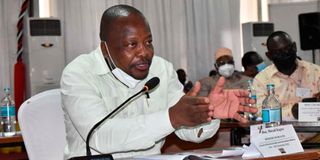No lockdown, Kagwe says as Kenya detects first Omicron cases

Ministry of Health Cabinet Secretary Mutahi Kagwe addresses governors during a High Level Consultative meeting at Sarova Whitesands Beach Resort on December 15, 2021.
What you need to know:
- Kenya is collaborating with Tanzania, Uganda and South Sudan to ensure they have a common position on tackling the spread of the virus.
- Mr Kagwe said decisions to impose containment measures must be well thought out and based on science, not emotions.
The government has ruled out reinstituting lockdowns even as the first three cases of the Covid-19 Omicron variant were confirmed among travellers arriving from South Africa.
Health Cabinet Secretary Mutahi Kagwe yesterday said a South African and two Kenyans have gone into isolation after they tested positive for the variant. He added that the country is ramping up its surveillance at all points of entry. The three arrived through the Jomo Kenyatta International Airport.
“Sequencing of the samples we have collected is ongoing and I can confirm we have detected three Omicron variant cases. We have a lot of other samples being sequenced and in the next two days, we will confirm the spread or otherwise across the country,” Mr Kagwe said in Mombasa where he met with the Council of Governors (CoG).
“It spreads fast... if one has been vaccinated, the level of attack is a lot less and the need for hospitalisation is limited... But once sequencing is done, then we will have a clearer picture,” Mr Kagwe said.
Kenya is also collaborating with its neighbours – Tanzania, Uganda and South Sudan – to ensure they have a common position on tackling the spread of the virus.
However, the government has ruled out any lockdown due to the surge in coronavirus cases and the new variant.
Mr Kagwe said decisions to impose containment measures must be well thought out and based on science, not emotions.
“We started the process of ensuring that persons arriving in Kenya, particularly from southern African countries, get tested at the airports, and we have been doing that for a while,” said Mr Kagwe.
“...what we have seen and heard from our colleagues in South Africa and other countries is that the level of hospitalisation is less than the Delta variant. We still have the Delta cases in our hospitals, we haven’t detected the Omicron variant in our facilities but we are carrying out sequencing in all our laboratories,” he added.

The CS said Kenya is yet to implement a policy regarding boosters.
“The question regarding whether to allow people to get a booster has arisen. But we haven’t started, we first want to give many people the first and second dose because it gives sufficient protection,” said the CS.
“Kenyans must be vaccinated; this is not time to debate or hesitate. If you haven’t been vaccinated you are threatening your livelihood; you will get sick faster, hospitalised and spend money and impoverish yourself with huge bills,” said the CS.
CoG Chairman Martin Wambora assured the ministry that counties are ready to work with the government protocols.
“Our ICU (intensive care unit) beds and oxygen plants are functional. We have enough bed capacity. Preparedness is the best way to deal with this kind of surprise,” said Mr Wambora.
Some counties had closed down most of their isolation facilities due to the reduced case-loads.
Saying the government will not force anyone to be vaccinated, Mr Kagwe said “we must recognise that internationally there are mitigating measures that must be followed. For example, in trains, buses and airlines you must show you are vaccinated. That is the practice elsewhere across the world and that is what is going to happen in Kenya,” Mr Kagwe said.

He said some countries have gone into emergency lockdowns and curfews to contain the new variant.
The government is currently engaging South Africa and other countries where the variant is spreading on how to deal with it.
Kenya’s positivity rate has risen sharply, from 1 per cent to more than 11 per cent in the past week.
“This time around, we should be better prepared as we have learned many lessons from the previous four waves. We must ramp up our vaccination programme, it is the surest and safest means to achieve protection from severe Covid-19 and death, as proven by science,” the CS said.
The CS urged counties to enhance their testing capacity to know the true magnitude of the disease at the community level.
“Prepare a health workforce surge capacity and ensure they are ready to respond to the potential increase in cases and any emergencies thereof. We must ready our ability to provide oxygen for all the cases that shall require this precious commodity,” he said.
Epidemiologists have also warned the government against imposing a lockdown.
Instead, the experts have asked the state to ensure there are sufficient beds in isolation centres.





